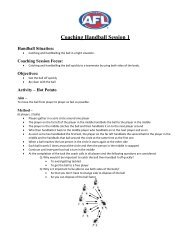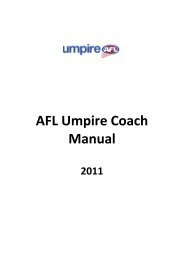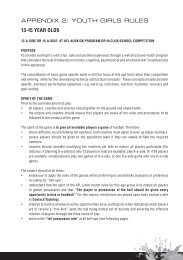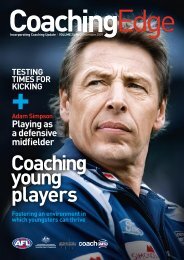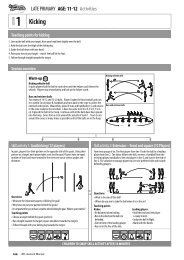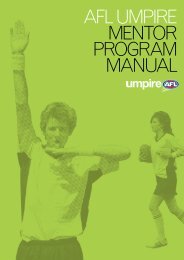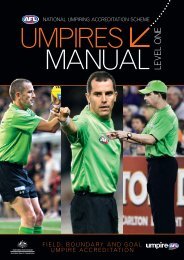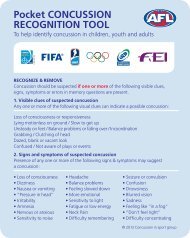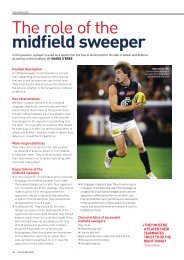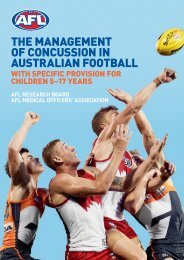AFL Coaching Manual - Western Bulldogs Football Club
AFL Coaching Manual - Western Bulldogs Football Club
AFL Coaching Manual - Western Bulldogs Football Club
You also want an ePaper? Increase the reach of your titles
YUMPU automatically turns print PDFs into web optimized ePapers that Google loves.
the coach<br />
Principles<br />
of effective<br />
traininG<br />
The coach needs to be aware<br />
of the general principles to<br />
ensure effective training.<br />
Awareness makes it possible for<br />
coaches to formulate training<br />
programs and sessions that have a<br />
positive impact on both the team and<br />
the individual.<br />
In becoming aware of the principles<br />
of effective training, coaches are<br />
able to design their training with<br />
appropriate consideration to the<br />
standard of the team.<br />
1. Plan, yet be flexible<br />
Time spent in organising the training session will make it easier for the players<br />
and the sequence of activities will flow. If a planned activity is not working or<br />
circumstances have changed (e.g. weather or reduced numbers), be prepared to<br />
adjust the activity to make it work.<br />
2. Give clear, concise instructions<br />
Be clear in your instructions. To stop an activity, use one clear word “stop” or a<br />
whistle. Before speaking, make sure all the group is in, and in front of you, so<br />
that you can see all the players. Keep instructions to a minimum by emphasising<br />
the main coaching points. Learning and motivation improves when the player<br />
knows what is expected.<br />
3. Demonstrations improve the accuracy of instructions<br />
When providing a demonstration, group the players in a single file, square,<br />
semi-circle or circle. Be conscious of the best viewing angles for the players to<br />
observe the demonstration. Repeat the demonstration a number of times before<br />
sending the players back to practise.<br />
4. Give positive feedback<br />
Observe your players during each of the activities, moving to individuals or<br />
groups that may need assistance. Emphasise and reward good performance<br />
and encourage the effort that is made to achieve the task.<br />
5. Provide variety<br />
Maintain interest by using various venues, warm-ups, drills, skill practices<br />
and modified games and guest coaches.<br />
chapter 4 – the training session<br />
6. Encourage enjoyment<br />
Training sessions should be fun, enjoyable and demanding. Players should look<br />
forward to coming to training through the content of the session as well as your<br />
passion and enthusiasm for the session.<br />
7. Create progression<br />
Learning improves if you plan for progressive skill development. Moving from<br />
simple to more complex skills facilitates this improvement.<br />
8. Record progress<br />
Certain training activities allow measurement that assesses progress.<br />
This assessment often enhances motivation to continually strive for<br />
skill improvement.<br />
9. Allow for individual differences<br />
Allow for different learning rates by being patient with the players who are<br />
progressing at a different rate than other players. Players will be at different<br />
stages of learning. Grouping players according to different skill levels or using<br />
more skilled players to assist less-skilled players facilitates the learning process.<br />
10. Keep all players active<br />
Maximise training time by keeping all players active and involved, being<br />
conscious of appropriate work-to-rest ratios. A skilful coach can judge when to<br />
stop an activity and move on to the next activity. Stop the activity when you are<br />
sure of what you are going to say and the next activity is set up.<br />
11. Communicate<br />
Make every effort to speak with and listen to as many players as possible on<br />
training nights. Communicate with players about their football as well their<br />
school/university life, their social life, work issues or family matters.<br />
CALLING THE SHOTS:<br />
GWS coach Kevin Sheedy<br />
has overseen his fair share of<br />
training sessions.<br />
50<br />
51



